Black Gold: Blue Star Coffee


Every night before bed, I go through my routine that helps me prepare for the morning. One of these includes making sure my coffee pot goes off by itself at 4:20 am.
The smell of brewing coffee helps me mentally prepare to get out of bed, and the anticipation of a good cup of coffee makes thing a bit more enjoyable.
Forget the alarm, I set my coffee pot, and if it doesn't go off, I'm not getting out of bed.
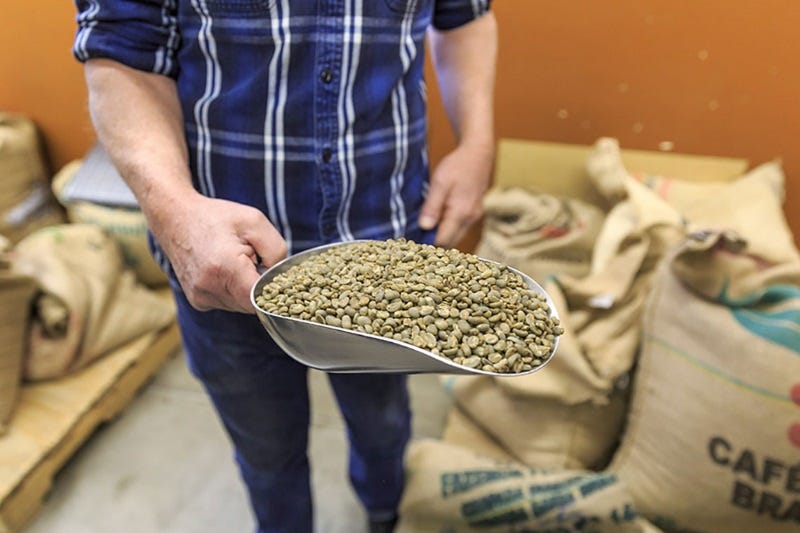
Luckily, the good folks at Twisp River Suites equipped our rooms with delay set coffee makers AND freshly ground coffee from Blue Star Coffee Roasters. I was set to carry on photographing late into the night and mentally prepared to deal with the consequences in the morning.
After meeting up with our group in the morning, I jumped in the far back seat to work on photos on our long car drive to Lewiston. Sam, however, had a different plan. Just a few miles down the road we stopped to see our friends at Blue Star Coffee for a little pick me up.
The aroma quickly shook off the cobwebs, and we introduced ourselves to Joseph. He quickly offered to introduce us to the owners, and before we knew it, we were on our way through a tour of Blue Star Coffee to learn the intricacies of small batch, award winning, artisan roasted coffee.
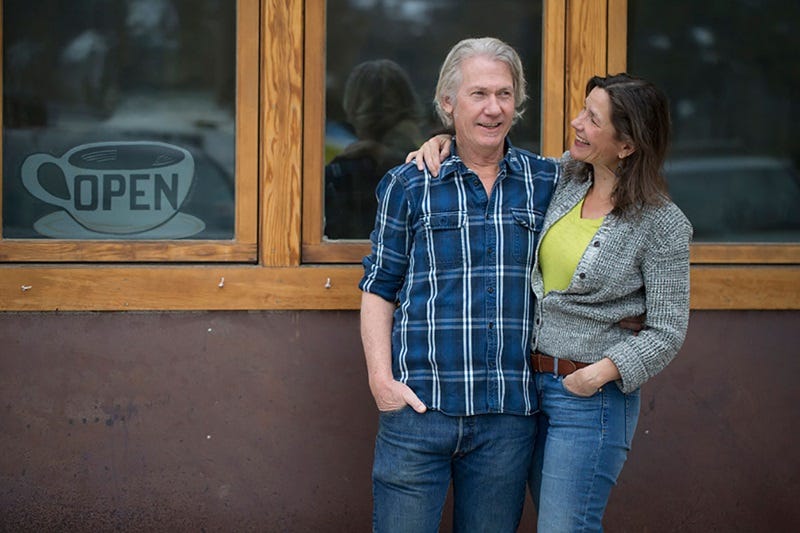
Meet the Owner's of Blue Star Coffee
Owners Dan and Meg Donohue moved to the Twisp area from Seattle, WA bringing with them years of coffee roasting knowledge. Bright city lights gave away to clear skies full of stars as they were preparing to open their own roasting facilities which would prove valuable when brainstorming a name for their new business.
Looking for coffee suggestions in the Northwest?
The blue light of Sirius shining in the northern sky every night gave them an idea, and they worked with a good friend to create an identity for Blue Star Coffee.
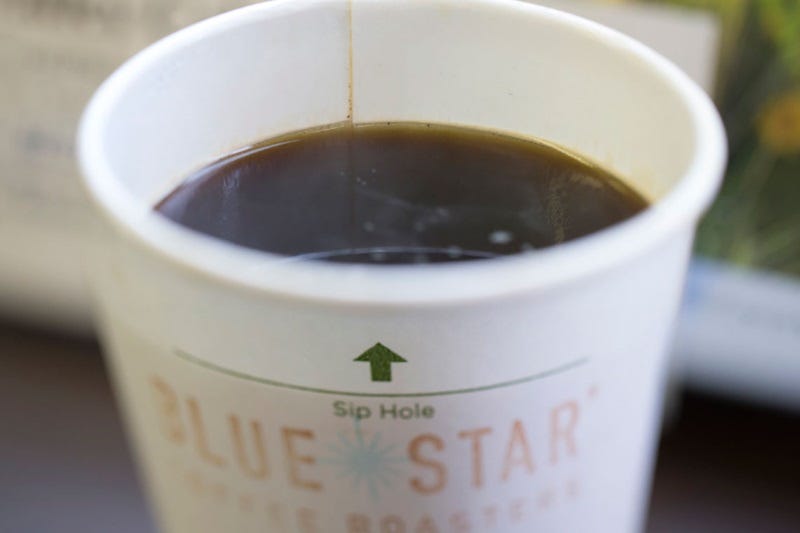
Coffee, Dan explains, is grown all over the world, all traded for some price making it the world's second largest trading commodity. But really good coffee, known as specialty coffee, is grown carefully by farmers, shipped in smaller quantities, and uniquely roasted for a much better flavor.
The Cherry Tree: Where Blue Star Coffee Comes From
It is a much better product that separates itself from the commodities and makes up just a small part of the world market. Dan purchases his own green coffee from relationships with coffee exporters, and importers he has developed over the years in the specialty coffee market.
Each coffee cherry produces its own unique qualities that are the product of where the coffee tree is grown. Regional traditions and processing techniques influence the flavor of the beans.
Everyone at Blue Star is involved in taste sampling every coffee bean side by side to check for consistency but ultimately it is up to Dan determine how each coffee will be roasted on their traditional 1963 German made Probat machine. The Probat roaster has been updated and modified with after burners for pollution control.
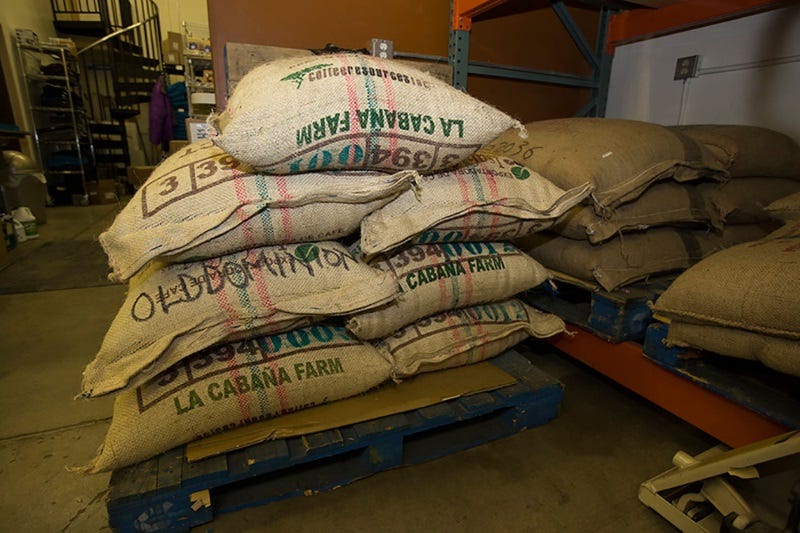
Roasting the Coffee Beans for Blue Star
Dan explains the complex chemistry of how the temperature is brought up different beans with the roaster over time results in different flavors from coffee beans.
They have a good idea and foundation of recipes but it is the coffee bean they choose, how they roast it, and how they blend it that makes it consistently good. A typical 42 pound batch takes about 16 to 18 minutes to roast as he carefully tunes in to his antique machine listening for everything it tells him.
If you like Blue Star Coffee, then you should check out Morning Star Coffee from Montana.
In a populated area like Seattle, the coffee capital of America, if something goes wrong with the Probat, there is couple machine shops per square mile but out in the Methow Valley, Dan has to take care of it himself with the help of his neighbors.
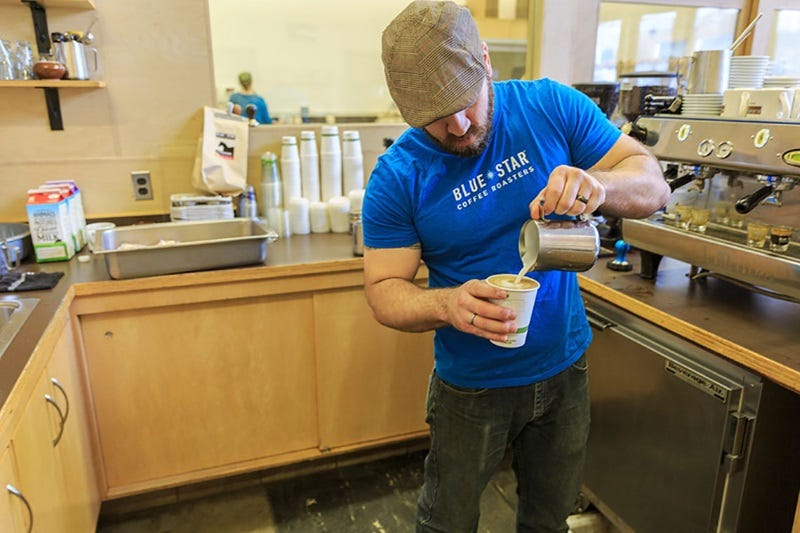
Coffee is not at its peak when it first comes out of the roaster. It takes a couple days for it to relax and rest. Once the batch has been roasted, it goes immediately to packaging into five pound date stamped bags so we can know how fresh it is.
The magic of roasting coffee produces layers of flavors and aroma from a simple seed with caffeine. All that flavor and aroma is quickly broken down when the roasted coffee is exposed to air causing it to become stale.
If you let it get stale, then you may as well be drinking cheaper coffee. A five pound bag at $10 to $12 per bag should last about a week to 10 days, which is less than 50 cents per cup. That's a pretty good deal for coffee coming from places as far away like Kenya all the way to your Local 40.
Keep your beans whole and sealed until you are ready to brew for best flavor. Fresh ground coffee before you make is the best.
Thanks to Dan, Meg and Joseph at Blue Star Coffee for their hospitality on our recent trip. It was a pleasure getting to know another of our Local Coffee roasters and be able to see how our local flavors come to life. Be sure to check your Local 40 for Must. Have. LOCAL Coffee.
